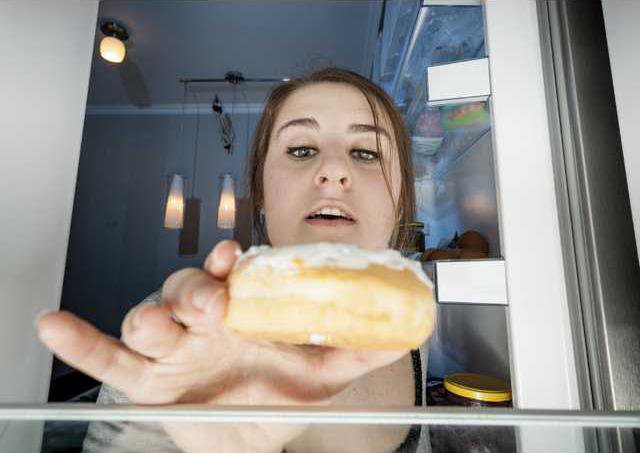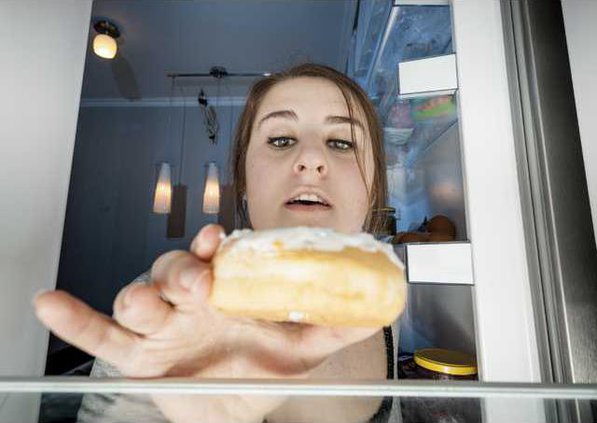When Darya Rose was dieting, a day spent avoiding sweets and eating fruits and vegetables would often end with her hand in a bag of trail mix.
"I would eat all the M&M's," she remembered with a laugh handful after handful, sabotaging her healthy behavior with an unplanned, oversized snack.
Now a popular food blogger, Rose has traded binging on trail mix for helping others break their bad eating habits. She said the woes of late-night snacking come up again and again.
"I sometimes send out tweets asking, 'What's your biggest food problem?' Snacking at night is often people's answer," Rose noted.
Overindulging in treats after dinner is a common enough quandary to merit scientific investigation. A new study (paywall) from researchers at Brigham Young University tracked the brain's response to food throughout the day, determining that dampened neural activity in the evening hours likely decreases an eater's experience of satisfaction and fullness. As a result, people might eat more "in order to attain the same level of reward as earlier in the day," they found, noting that people should snack early if they're going to snack at all.
Travis Masterson, a graduate student in exercise sciences and the study's lead researcher, said he hoped the findings would empower people to overcome their cravings, noting that "the first step to changing your behavior is to be aware of it and the things influencing it."
He and other food experts urged troubled eaters to trade late-night snacks for healthier and more satisfying habits.
Late-night snacking and the brain
In the study, researchers used brain scans of 15 women to explore how neural responses to food images changed from morning to evening.
By comparing MRI images taken between 6:30 and 8:30 a.m. to a second set taken between 5 and 7 p.m., they determined that the brain's reaction to food weakens over the course of a day.
According to Masterson, the findings contradicted the team's hypothesis. Given previous research showing obese men and women have a stronger neural reaction to food than normal-weight people, the researchers had predicted the brain's responses would be stronger at night, when people generally consume the majority of their daily caloric intake.
"We had to think through some of the other things that could be happening," he said.
The team determined that overeating was likely triggered indirectly, as a result of activity in certain reward centers in the brain being muted during the evening hours and reducing the satisfaction people received from snacking. Of the six different areas of the brain linked to the shift in reaction to food at night, three the amygdala, hippocampus and ventral striatum are involved in the way the body processes motivation and reward.
As a news release on the study from Brigham Young University put it, a single-Oreo snack can quickly become four when people feel like they haven't gotten a high enough emotional pay-off from their late-night indulgence.
Masterson hopes the study will inspire ongoing investigation into how meal times influence eating behaviors, as well as encourage everyday people to think critically about why and when they snack.
"At night, eating isn't as satisfying. You can modify your behavior to reflect that," he said.
Satisfaction without snacking
While agreeing that the new research on late-night snacking could help people adjust their eating habits, Rose said it can be tricky to try to base food behaviors around science, especially when emotional attachments are strong.
"People just want comfort," she said. "When you're stressed, you search for a snack and shut down your rational thinking."
Rather than trusting in their own awareness of the brain's late-night weakness to ward off cravings, Rose suggested people come up with replacement activities, which can reduce stress without affecting the waistline.
"You can take a warm bath or drink some tea. I personally love having mint tea. It's satisfying and you don't want to go eat something after drinking it," said Rose, who published the book "Foodist: Using Real Food and Real Science to Lose Weight Without Dieting" in 2013.
Tamara Duker Freuman, a registered dietician based in New York City, offered similar advice, noting that resisting after-dinner snacks might also require being strict with yourself at the grocery store.
"If you have (snacks) in the house, you'll have to say no," she said. It's easier to avoid buying the trail mix, Oreos or candy in the first place.
Willpower, like the brain's response to food stimuli, weakens over the course of the day, Freuman said. That's why she encourages her clients to avoid temptations late in the day.
Even the healthiest eaters will slip up sometimes, Rose added. But research like Masterson's study can help people keep their snacking in perspective.
"When you can say to yourself, 'Oh, this is just what happens to human beings at night or when they get stressed, you feel less guilty about your own out-of-control snacking, she said. "You can think, 'Oh this is normal. I just need a strategy to deal with it.
"I would eat all the M&M's," she remembered with a laugh handful after handful, sabotaging her healthy behavior with an unplanned, oversized snack.
Now a popular food blogger, Rose has traded binging on trail mix for helping others break their bad eating habits. She said the woes of late-night snacking come up again and again.
"I sometimes send out tweets asking, 'What's your biggest food problem?' Snacking at night is often people's answer," Rose noted.
Overindulging in treats after dinner is a common enough quandary to merit scientific investigation. A new study (paywall) from researchers at Brigham Young University tracked the brain's response to food throughout the day, determining that dampened neural activity in the evening hours likely decreases an eater's experience of satisfaction and fullness. As a result, people might eat more "in order to attain the same level of reward as earlier in the day," they found, noting that people should snack early if they're going to snack at all.
Travis Masterson, a graduate student in exercise sciences and the study's lead researcher, said he hoped the findings would empower people to overcome their cravings, noting that "the first step to changing your behavior is to be aware of it and the things influencing it."
He and other food experts urged troubled eaters to trade late-night snacks for healthier and more satisfying habits.
Late-night snacking and the brain
In the study, researchers used brain scans of 15 women to explore how neural responses to food images changed from morning to evening.
By comparing MRI images taken between 6:30 and 8:30 a.m. to a second set taken between 5 and 7 p.m., they determined that the brain's reaction to food weakens over the course of a day.
According to Masterson, the findings contradicted the team's hypothesis. Given previous research showing obese men and women have a stronger neural reaction to food than normal-weight people, the researchers had predicted the brain's responses would be stronger at night, when people generally consume the majority of their daily caloric intake.
"We had to think through some of the other things that could be happening," he said.
The team determined that overeating was likely triggered indirectly, as a result of activity in certain reward centers in the brain being muted during the evening hours and reducing the satisfaction people received from snacking. Of the six different areas of the brain linked to the shift in reaction to food at night, three the amygdala, hippocampus and ventral striatum are involved in the way the body processes motivation and reward.
As a news release on the study from Brigham Young University put it, a single-Oreo snack can quickly become four when people feel like they haven't gotten a high enough emotional pay-off from their late-night indulgence.
Masterson hopes the study will inspire ongoing investigation into how meal times influence eating behaviors, as well as encourage everyday people to think critically about why and when they snack.
"At night, eating isn't as satisfying. You can modify your behavior to reflect that," he said.
Satisfaction without snacking
While agreeing that the new research on late-night snacking could help people adjust their eating habits, Rose said it can be tricky to try to base food behaviors around science, especially when emotional attachments are strong.
"People just want comfort," she said. "When you're stressed, you search for a snack and shut down your rational thinking."
Rather than trusting in their own awareness of the brain's late-night weakness to ward off cravings, Rose suggested people come up with replacement activities, which can reduce stress without affecting the waistline.
"You can take a warm bath or drink some tea. I personally love having mint tea. It's satisfying and you don't want to go eat something after drinking it," said Rose, who published the book "Foodist: Using Real Food and Real Science to Lose Weight Without Dieting" in 2013.
Tamara Duker Freuman, a registered dietician based in New York City, offered similar advice, noting that resisting after-dinner snacks might also require being strict with yourself at the grocery store.
"If you have (snacks) in the house, you'll have to say no," she said. It's easier to avoid buying the trail mix, Oreos or candy in the first place.
Willpower, like the brain's response to food stimuli, weakens over the course of the day, Freuman said. That's why she encourages her clients to avoid temptations late in the day.
Even the healthiest eaters will slip up sometimes, Rose added. But research like Masterson's study can help people keep their snacking in perspective.
"When you can say to yourself, 'Oh, this is just what happens to human beings at night or when they get stressed, you feel less guilty about your own out-of-control snacking, she said. "You can think, 'Oh this is normal. I just need a strategy to deal with it.








